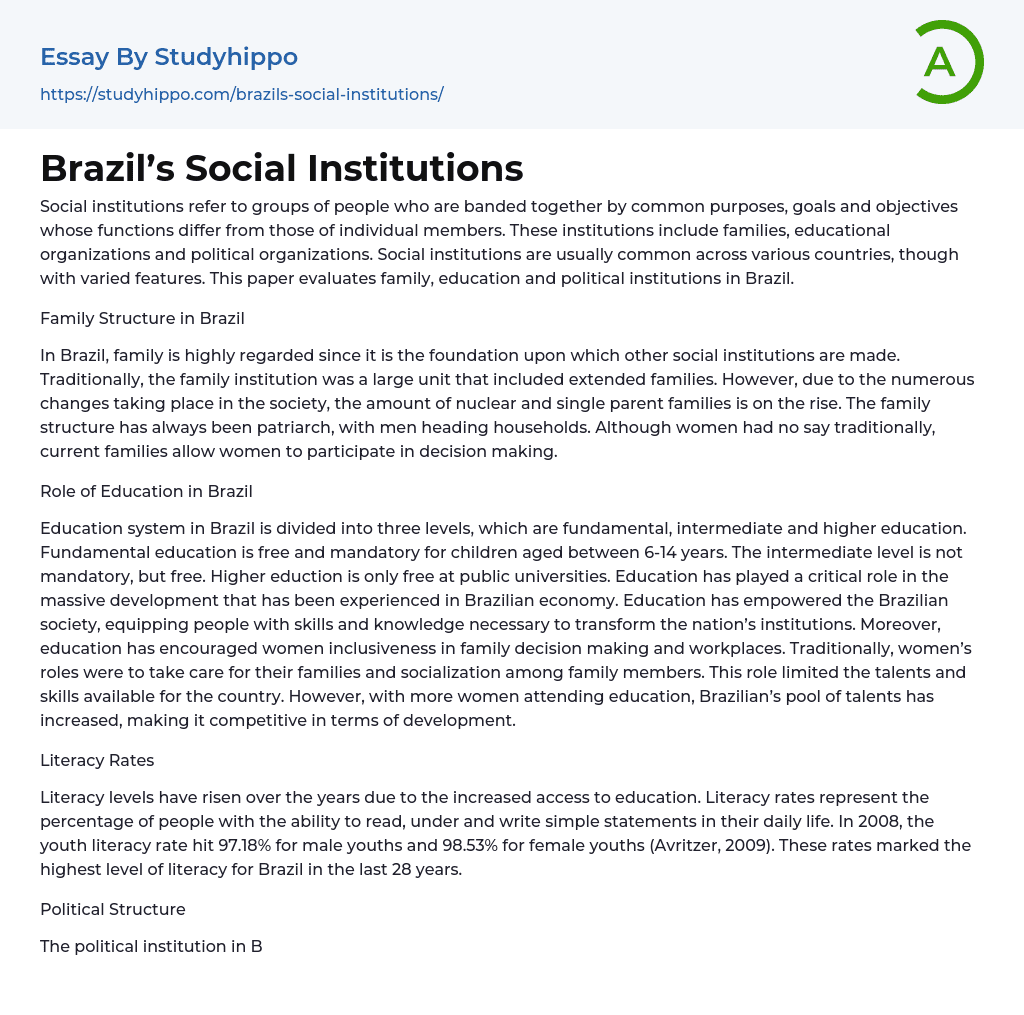Social institutions refer to groups of people who are banded together by common purposes, goals and objectives whose functions differ from those of individual members. These institutions include families, educational organizations and political organizations. Social institutions are usually common across various countries, though with varied features. This paper evaluates family, education and political institutions in Brazil.
Family Structure in Brazil
In Brazil, family is highly regarded since it is the foundation upon which other social institutions are made. Traditionally, the family institution was a large unit that included extended families. However, due to the numerous changes taking place in the society, the amount of nuclear and single parent families is on the rise. The family structure has always been patriarch, with men heading households. Although women had no say traditionally, current families allow women to participate in decision making.
...
Role of Education in Brazil
Education system in Brazil is divided into three levels, which are fundamental, intermediate and higher education. Fundamental education is free and mandatory for children aged between 6-14 years. The intermediate level is not mandatory, but free. Higher eduction is only free at public universities. Education has played a critical role in the massive development that has been experienced in Brazilian economy. Education has empowered the Brazilian society, equipping people with skills and knowledge necessary to transform the nation’s institutions. Moreover, education has encouraged women inclusiveness in family decision making and workplaces. Traditionally, women’s roles were to take care for their families and socialization among family members. This role limited the talents and skills available for the country. However, with more women attending education, Brazilian’s pool of talents has increased, making it competitive in terms of
View entire sample
Join StudyHippo to see entire essay
Role of Education in Brazil
Education system in Brazil is divided into three levels, which are fundamental, intermediate and higher education. Fundamental education is free and mandatory for children aged between 6-14 years. The intermediate level is not mandatory, but free. Higher eduction is only free at public universities. Education has played a critical role in the massive development that has been experienced in Brazilian economy. Education has empowered the Brazilian society, equipping people with skills and knowledge necessary to transform the nation’s institutions. Moreover, education has encouraged women inclusiveness in family decision making and workplaces. Traditionally, women’s roles were to take care for their families and socialization among family members. This role limited the talents and skills available for the country. However, with more women attending education, Brazilian’s pool of talents has increased, making it competitive in terms of
development.
Literacy Rates
Literacy levels have risen over the years due to the increased access to education. Literacy rates represent the percentage of people with the ability to read, under and write simple statements in their daily life. In 2008, the youth literacy rate hit 97.18% for male youths and 98.53% for female youths (Avritzer, 2009). These rates marked the highest level of literacy for Brazil in the last 28 years.
Political Structure
The political institution in Brazil is composed of a constitutionally mandated government with three arms (Avritzer, 2009). The firsst arm of the government is the legislature, which is a mandate to make laws for the country. The executive is the second arm of the government, which implements the laws made by the legislature. The final arm of the government is the judiciary, which interprets the laws and the constitution for proper implementation. Apart from the three arms of the government, the Brazilian political institution has a well-defined voting system where people between the ages of 18 and 70 years must vote. Those vying for various political positions are required to belong to a political party. Brazil is composed of 26 states that are run by governors and one federal district. Each state has its own rules that mirror the federal government and,fit the needs of different states.
Political Parties, Government Stability and Business
Brazil has a multi-party system where many parties exist within political institutions. Due to the large number of political parties, no single party can win an election unless they combine to form a coalition. Brazilian political institutions are very stable, with well-defined entities that are functional. The result of this stability is the attraction of
investors to the country. The stability of the country ensures a predictable customer base for businesses. However, there are practices such as corruption and bureaucracy that hinder business transactions.
- Academia essays
- Higher Education essays
- Language Learning essays
- Studying Business essays
- Education System essays
- Study essays
- First Day of School essays
- Scholarship essays
- Pedagogy essays
- Curriculum essays
- Coursework essays
- Studying Abroad essays
- Philosophy of Education essays
- Purpose of Education essays
- Brainstorming essays
- Educational Goals essays
- Importance Of College Education essays
- Brown V Board of Education essays
- The Importance Of Higher Education essays
- Online Education Vs Traditional Education essays
- Academic And Career Goals essays
- Academic Integrity essays
- Brown Vs Board Of Education essays
- Distance learning essays
- Technology in Education essays
- Vocabulary essays
- Writing Experience essays
- Importance of Education essays
- Early Childhood Education essays
- Academic Degree essays
- Academic Dishonesty essays
- School Uniform essays
- Academic writing essays
- Cheating essays
- Bachelor's Degree essays
- MBA essays
- College Life essays
- Grade essays
- Diploma essays
- Phonology essays
- Sentence essays
- Filipino Language essays
- Pragmatics essays
- Millennium Development Goals essays
- History Of Education essays
- Graduate School essays
- Middle School essays
- School essays
- Special Education essays
- University essays




